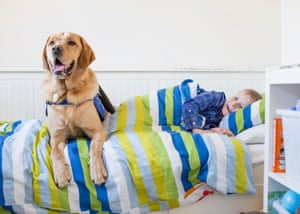Hounds of love: ​how ​support dogs​ can help with everything from diabetes to autism | Life and style
Coco, a chocolate-brown cocker spaniel puppy, had been living with her owner for just three days when it is likely she saved her life for the first time. Now, six months later, it happens daily. Millie Law, who is 12, has a complex form of type 1 diabetes, which gives her no indication when her blood sugar levels are dangerously low or high. Coco, who can use her powerful sense of smell to detect changes on Millie’s breath or sweat, is one of about 7,000 dogs in Britain offering life-changing â€" and sometimes life-saving â€" support to children and adults with a growing range of medical conditions and disabilities.
As well as guide dogs for the blind and hearing dogs, specially trained dogs can provide practical support to those with conditions ranging from multiple sclerosis and cerebral palsy to the effects of stroke and autism. Others can alert to dangerous situations in type 1 diabetes, epilepsy, Addison’s disease, nut allergy, narcolepsy and some cardiac conditions.
“Coco is a guardian angel,†says Millie’s father, Graham. “Before she arrived, Millie didn’t feel safe. She had several frightening emergency hospital admissions. Now she knows Coco is looking after her wherever she goes.â€
Coco is in the process of becoming an accredited diabetic alert dog through the organisation Hypo Hounds. Unusually, this new charity works with and trains pet dogs rather than by matching people with pre-trained dogs. Coco is now eight months, and her training should be complete â€" with her identifying 80% of Millie’s hypos (blood glucose lows) and hypers (highs) â€" by the age of two.
Coco alerts Millie by barking or pawing at her. In time, she will also then fetch an emergency treatment kit. Though Millie does wear a continuous glucose monitor, it only indicates a problem about 15 minutes after her glucose level has fallen or risen too far. Alert dogs can detect glucose changes around 30 minutes before the level reaches a danger point.
Graham hopes Coco’s skills will allow Millie “a more typical teenage lifeâ€; previously difficult not just because of the medical risks, but also because of her lack of confidence. “Millie was too scared to go out without us or to meet friends, and we were worried to let her go. At parties or school trips, she had to have one of us. As a teenager that isn’t ideal.â€
Since her diagnosis aged six, Millie’s parents have checked her at 2am every night. “To be honest, every morning we go into Millie’s room to check she is breathing. Extra peace of mind would be incredible.†Aside from her vital alert work, Coco is affectionate and playful pet. “She has been our family dog from the start â€" we all love her â€" but she has an incredible bond with Millie. She follows her everywhere. Coco is like a best friend.â€

For Cohen Hadfield, nine, from South Yorkshire, a canine friend has also been life-changing. Cohen has autism, global developmental delay, a hearing impairment and complex epilepsy. His mother, Sarah, credits Azerley â€" a labrador/golden retriever cross which has been with the family for three years â€" with boosting his communication, social skills and happiness.
“Before Azerley, Cohen’s anxiety was so bad we couldn’t really go out. He would refuse or bolt off into the road. We were very isolated and Cohen was so fearful that he started biting his hands. He couldn’t express himself any other way,†she says. “It was heartbreaking.â€
Cohen had previously shown no interest in animals and so, admits Sarah, her expectations were low â€" “but we were prepared to try anythingâ€. She approached the charity Support Dogs and, after a careful matching process, Azerley â€" a trained autism-assistance dog with the same public access rights as a guide dog â€" was introduced to the family. “He was lying on the floor and Cohen was watching. Then Cohen went over and just touched Azerley’s paw. It was,†says Sarah, “an incredible moment.â€
Cohen’s trust in Azerley grew rapidly. “I think Cohen senses his unconditional love, no matter how he is feeling. A human has expectations â€" eye contact, conversation â€" and can be unpredictable. Azerley is a constant, reassuring presence,†she says. “Since the day he moved in, Cohen has never bitten his hands.†The family now enjoys outings â€" “shopping, to the cinema, bowling†â€" with Cohen happy to walk attached by a harness to Azerley. “This is exactly what Cohen needs to build life skills and unlock his potential. He can interact with his surroundings, point things out, investigate.â€
Should Cohen try to bolt â€" now very unusual â€" the dog is able to hold him still. And when Cohen’s anxiety does rise, Azerley nudges him or puts his head on the boy’s lap. At home, Cohen loves to have Azerley lie on his legs (like many children with autism, Cohen finds pressure calming). “He is like a huge sensory teddy bear for Cohen,†says Sarah.
“He just grins and sings to Azerley.†This, says Sarah, is incredible for a recently non-verbal child. “Cohen was using signs, but he soon began to say the words to Azerley as well.†With the dog’s support, Cohen has now enjoyed his first trip to the beach. “Azerley sat beside him as he built his first sandcastle,†says Sarah. As Cohen’s confidence and independence grow, Azerley’s practical role â€" which currently includes getting Cohen’s clothes out and guiding him through his morning routine â€" will gradually reduce. By the time Azerley officially stops working, aged about 10, he will be simply a pet for the family. It will be, Sarah believes, a richly deserved retirement. “Cohen was locked in his own world. Azerley has been able to reach in and bring him back.â€
hypohounds.co.uk
supportdogs.org.uk

0 Response to "Hounds of love: ​how ​support dogs​ can help with everything from diabetes to autism | Life and style"
Posting Komentar